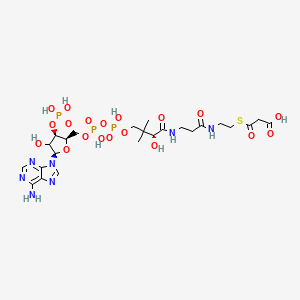| MeSH term | MeSH ID | Detail |
|---|---|---|
| Diabetes Mellitus | D003920 | 90 associated lipids |
| Adenocarcinoma | D000230 | 166 associated lipids |
| Reperfusion Injury | D015427 | 65 associated lipids |
| Diabetes Mellitus, Type 2 | D003924 | 87 associated lipids |
| Fatty Liver | D005234 | 48 associated lipids |
| Ketosis | D007662 | 13 associated lipids |
| Body Weight | D001835 | 333 associated lipids |
| Heart Failure | D006333 | 36 associated lipids |
| Prostatic Neoplasms | D011471 | 126 associated lipids |
| Hypothyroidism | D007037 | 32 associated lipids |
Lmfa07050031
Lmfa07050031 is a lipid of Fatty Acyls (FA) class. The involved functions are known as Pigment and Polymerization. The related lipids are Propionate.
Cross Reference
Introduction
To understand associated biological information of Lmfa07050031, we collected biological information of abnormalities, associated pathways, cellular/molecular locations, biological functions, related genes/proteins, lipids and common seen animal/experimental models with organized paragraphs from literatures.
What diseases are associated with Lmfa07050031?
There are no associated biomedical information in the current reference collection.
Possible diseases from mapped MeSH terms on references
We collected disease MeSH terms mapped to the references associated with Lmfa07050031
PubChem Associated disorders and diseases
What pathways are associated with Lmfa07050031
There are no associated biomedical information in the current reference collection.
PubChem Biomolecular Interactions and Pathways
Link to PubChem Biomolecular Interactions and PathwaysWhat cellular locations are associated with Lmfa07050031?
There are no associated biomedical information in the current reference collection.
What functions are associated with Lmfa07050031?
Related references are published most in these journals:
| Function | Cross reference | Weighted score | Related literatures |
|---|
What lipids are associated with Lmfa07050031?
Related references are published most in these journals:
| Lipid concept | Cross reference | Weighted score | Related literatures |
|---|
What genes are associated with Lmfa07050031?
There are no associated biomedical information in the current reference collection.
What common seen animal models are associated with Lmfa07050031?
There are no associated biomedical information in the current reference collection.
NCBI Entrez Crosslinks
All references with Lmfa07050031
Download all related citations| Authors | Title | Published | Journal | PubMed Link |
|---|---|---|---|---|
| Richardson MT et al. | Tolerance and specificity of recombinant 6-methylsalicyclic acid synthase. | 1999 | Metab. Eng. | pmid:10935930 |
| Roduit R et al. | Glucose down-regulates the expression of the peroxisome proliferator-activated receptor-alpha gene in the pancreatic beta -cell. | 2000 | J. Biol. Chem. | pmid:10967113 |
| Jackson VN et al. | Identification of positive and negative determinants of malonyl-CoA sensitivity and carnitine affinity within the amino termini of rat liver- and muscle-type carnitine palmitoyltransferase I. | 2000 | J. Biol. Chem. | pmid:10969089 |
| Suh DY et al. | Evidence for catalytic cysteine-histidine dyad in chalcone synthase. | 2000 | Biochem. Biophys. Res. Commun. | pmid:10973790 |
| Goodwin GW and Taegtmeyer H | Improved energy homeostasis of the heart in the metabolic state of exercise. | 2000 | Am. J. Physiol. Heart Circ. Physiol. | pmid:11009433 |
| Odland LM et al. | Effects of high fat provision on muscle PDH activation and malonyl-CoA content in moderate exercise. | 2000 | J. Appl. Physiol. | pmid:11090589 |
| Winder WW and Holmes BF | Insulin stimulation of glucose uptake fails to decrease palmitate oxidation in muscle if AMPK is activated. | 2000 | J. Appl. Physiol. | pmid:11090599 |
| McGarry JD | Malonyl-CoA and satiety? Food for thought. | 2000 | Trends Endocrinol. Metab. | pmid:11091115 |
| Suo Z et al. | Acyl-CoA hydrolysis by the high molecular weight protein 1 subunit of yersiniabactin synthetase: mutational evidence for a cascade of four acyl-enzyme intermediates during hydrolytic editing. | 2000 | Proc. Natl. Acad. Sci. U.S.A. | pmid:11106385 |
| Mulder H et al. | Overexpression of a modified human malonyl-CoA decarboxylase blocks the glucose-induced increase in malonyl-CoA level but has no impact on insulin secretion in INS-1-derived (832/13) beta-cells. | 2001 | J. Biol. Chem. | pmid:11113153 |
